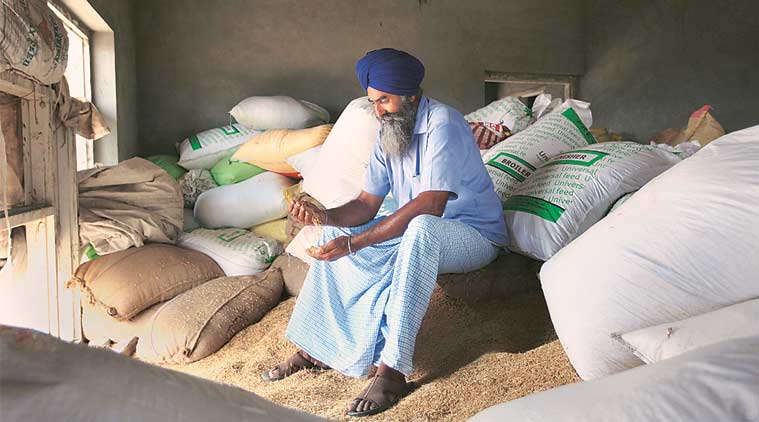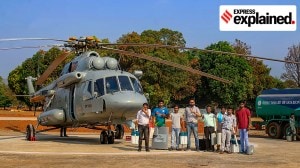- India
- International
GI Battle: Rice millers in Madhya Pradesh claim superiority of basmati variety grown in state
According to Arora, whose Rs 3,500-crore sales company sells basmati rice under the Daawat brand, the soil and environmental conditions in MP are best suited for growing the high-yielding Pusa Basmati-1 variety.
 Madhya Pradesh farmers contend Pusa Basmati-1 is superior when grown in their region as opposed to being cultivated in states such as Punjab, Haryana. (Express Archive)
Madhya Pradesh farmers contend Pusa Basmati-1 is superior when grown in their region as opposed to being cultivated in states such as Punjab, Haryana. (Express Archive)
Even as the Geographical Indications (GI) Registry has rejected the claim of Madhya Pradesh to be included as a traditional basmati-growing area, rice millers in the state are challenging the order. Central to their argument is that the quality of rice, from an improved variety, Pusa Basmati-1, is superior when cultivated in MP, as opposed to Haryana, Punjab or West Uttar Pradesh (UP).
“MP accounts for 50 per cent of India’s area under Pusa Basmati-1 and 70 per cent of the export of this rice variety to the western world (US and Europe). That itself is proof of the quality of basmati being grown by farmers in MP. Since GI certification is meant primarily to protect the quality of a product, it is unfair to deny recognition to MP as a basmati-growing state,” says Ashwani Arora, managing director & CEO of LT Foods Ltd.
The MP government had demanded that 13 of its districts — Morena, Bhind, Sheopur, Gwalior, Datia, Shivpuri, Guna, Vidisha, Raisen, Sehore, Hoshangabad, Narsinghpur and Jabalpur — be given the GI tag for basmati paddy, along with the areas of Jammu & Kashmir, Himachal Pradesh, Uttarakhand, Punjab, Haryana and Western UP in the Indo-Gangetic plain below the foothills of the Himalayas. The GI Registry under the Office of the Controller General of Patents, Designs and Trade Marks, however, rejected MP’s contention in its order dated March 15.
According to Arora, whose Rs 3,500-crore sales company sells basmati rice under the Daawat brand, the soil and environmental conditions in MP are best suited for growing the high-yielding Pusa Basmati-1 variety. The traditional tall basmati cultivars are suited for saline and alkaline soils of pH 7-9 found in states such as Haryana. But Pusa Basmati-1 is ideal for the neutral to acidic soils of MP with 6-8 pH.
“Also, the shallow to deep black soil in MP is better for moisture retention. And with the main growing areas (Raisen, Vidisha and Hoshangabad) getting twice the rainfall of Haryana and Punjab, the crop gets enough water without a flood-like situation. That, in turn, also makes it less prone to pest and disease attack,” says a company official.

The common pests in basmati include the brown and white plant hopper (sap-sucking insects that attack between mid-September and mid-October), while diseases are mainly the leaf and neck blast fungus that infest the nodes of the plant’s main stem (from where the grain-bearing earheads or panicles emerge).
“The stagnant water and high humidity during late-August is particularly conducive to the blast in Haryana. Farmers, therefore, are forced to spray fungicides like Tricyclazole and also insecticides such as Buprofezin and Picoxystrobin against plant hoppers. All this leads to pesticide residue issues, whereas you don’t get these conditions in MP’s well-drained soils,” the official states.
The other advantage that MP has is the less sharp drop in temperatures during the October-November period at the time of flowering and grain-filling. While traditional basmati paddy or even other high-yielding varieties such as Pusa-1121 and Pusa-1509 can tolerate these, Pusa Basmati-1 cannot. The latter when grown in MP, hence, yields better quality paddy with more grain length and less chalkiness due to more complete filling. “That is precisely why Pusa Basmati-1 rice from MP has good consumer acceptance in the western world,” adds the official.
But whether this argument will cut ice with regard to GI certification remains to be seen. The GI Registry, in its order, held that MP did not satisfy “the fundamental requirement of popular perception” as a traditional basmati-growing area for being granted the coveted tag. Basmati’s GI character was derived from its supposed uniqueness as a rice grown in a specific region. MP did not fall in this specific geography, namely the Indo-Gangetic plain “situated below the foothills of the Himalayas”.
However, the fact that about 2 lakh hectares area is today under basmati cultivation in MP (of which 1.5-1.6 lakh hectares comprises Pusa Basmati-1), and the one million tonnes of paddy from this is worth Rs 2,600 crore, makes the GI issue fraught with complexity. “What will these farmers do if they are denied the right to grow basmati? Can you force them to cultivate soyabean, which yields only one tonne per hectare (against 5 tonnes from Pusa Basmati-1) and fetches a marginally higher price (Rs 30,000/tonne versus Rs 26,000/tonne)?” a rice miller in Mandideep near Bhopal asks.
Best of Express
Apr 18: Latest News
- 01
- 02
- 03
- 04
- 05





























